By Lucy Komisar

For 19 years, impresario Scott Siegel has been delving into the past of American musicals to put before theater and cabaret fans the best known and hidden gems of the decades. And also presenting some of the finest performers to them. He picks a couple of years. The years 1943 and 1951 in this show were typically marked by blockbusters and some shows I never knew.
Scott himself is very low-key funny, providing intros such as what a press agent said about a new play: “Oklahoma? It‘s as good as calling it New Jersey!”
Among my favorites, William Michals in farmer‘s jeans and a glorious, rich baritone opens the show singing with no mike as one did in Oklahoma in 1943: “There‘s a bright golden haze on the meadow ….Oh what a beautiful morning!” It was a gorgeous evening at Town Hall.
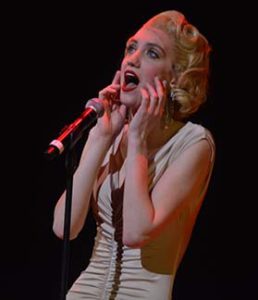
The next delight, because I didn‘t know her at all, was Oakley Boycott, doing a smashing rendition of “I‘m a Stranger Here Myself” from One Touch of Venus. That was a satirical play with music by Kurt Weill, lyrics by Ogden Nash, and book by S. J. Perelman and Nash.
She doesn‘t know why the guy who awakens her (she is a statue) is not interested in her. She emotes it as a torch song. It was the highlight of the show.
“Tell me is love still a popular suggestion
Or merely an obsolete art?
Forgive me for asking, this simple question
I’m unfamiliar with his heart
I am a stranger here myself.”
Mary Martin sang it in the original. I could see Marlene Dietrich in that role.
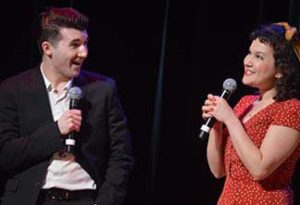
Michals and Boycott set the bar high and the others meet it.
So back and forth with Oklahoma and Venus, with a few others in the first act.
Laurel Harris acts the part as well as sings Oklahoma‘s “I Can‘t Say No” in jeans jacket and flowered dress. Matt Weinstein and Madeline Hamlet do a fine duet, she as Annie, in “All ˜Er Nothin‘”: “Is it all or nothin‘ with you.? There are country accents and a jazzy beat.
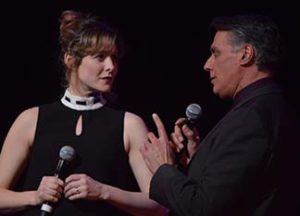
To “People will say we‘re in love,” Robert Cuciolli and Jill Paice bring her elegant, soaring operatic soprano and his rich baritone.
In “Speak Low” from Venus, Darius de Haas has a tenor‘s modern touch. You will know the lyrics:
“Speak low when you speak love
Our summer day withers away too soon, too soon
Speak low when you speak love
Our moment is swift, like ships adrift, we’re swept apart, too soon”

Stephen DeRosa, a fixture in New York, did a very satirical “Very, Very, Very” from Venus. A satire about the rich, it was dropped from the score before opening night. (Of course, you can‘t offend the ticket buyers!) A Superrich guy is determined to bring art to the masses – he was maybe modeled on Nelson Rockefeller who was at a time president of MOMA. DeRosa is a very good story teller.
“Something for the Boys” from a play of that name, shows a woman who got radio signals through her teeth. Laurel Harris belted it out like Merman would. (Never heard of it!)
So, what changed in 1951? Scott tells us the Korean War and TV, which hurt Broadway.
Still there was Paint your Wagon, though that never became a blockbuster. “They call the wind Maria” is a charming ballad, sung with tenderness by Robert Cuccioli, infusing the song with great feeling.
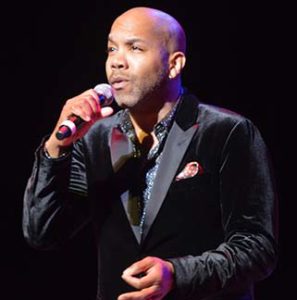
And there is a terrific Michals in jeans and black turtle neck, ever the story teller, the long notes in his deep baritone shining in “I was born under a wand‘rin‘ star” from the same show.
There were a couple of other lesser known productions of the time, A Tree Grows in Brooklyn, (never saw it) with Jill Paice filling the room with her lilting soprano in “Make the man love me.”
But the main event, the highlight was the grand, sweeping music of The King and I!
When Darius de Haas sings “I have dreamed that your arms are lovely, I have dreamed what a joy you’ll be,” you hear his emotion, his voice soaring.

Then Dongwoo Lang, “We kiss in the shadows,” with sadness as the young man in love with the slave girl who has been sent as a present to the king. He has been performing in the show throughout the US.
Musicals also have dances, and the very good Broadway by the Year Dance Troup, directed by Danny Gardner, brings down the first act curtain with an Oklahoma hoe down and the second act with The King and I‘s “Shall we dance.” Scott told how it had been added to the show and that Gertrude Lawrence, the star, insisted on doing it in a billowing skirt.
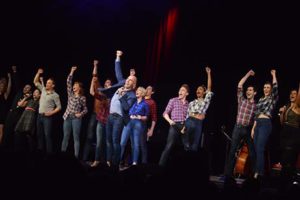
Gardner is a terrific solo dancer. Loved his dance with a broom in Broadway style tap: great panache!
The next Scott Siegel event is Broadway Musicals of 1965 and 1978 on Monday, May 20 at 8pm. It will feature 1965 musicals including Do I Hear a Waltz?, Flora, the Red Menace, The Roar of the Greasepaint, the Smell of the Crowd, On a Clear Day You Can See Forever, Man of La Mancha, and 1978 musicals including On the Twentieth Century, Ain’t Misbehavin’, Working, Best Little Whorehouse in Texas, Eubie!, Ballroom, and more.
Broadway by the Year, 1943, 1951. Created, written, hosted and directed by Scott Siegel for The Town Hall, 123 West 43rd Street. 800-982-2787. March 25, 2019. Tickets $57-$67. 4/17/19.

